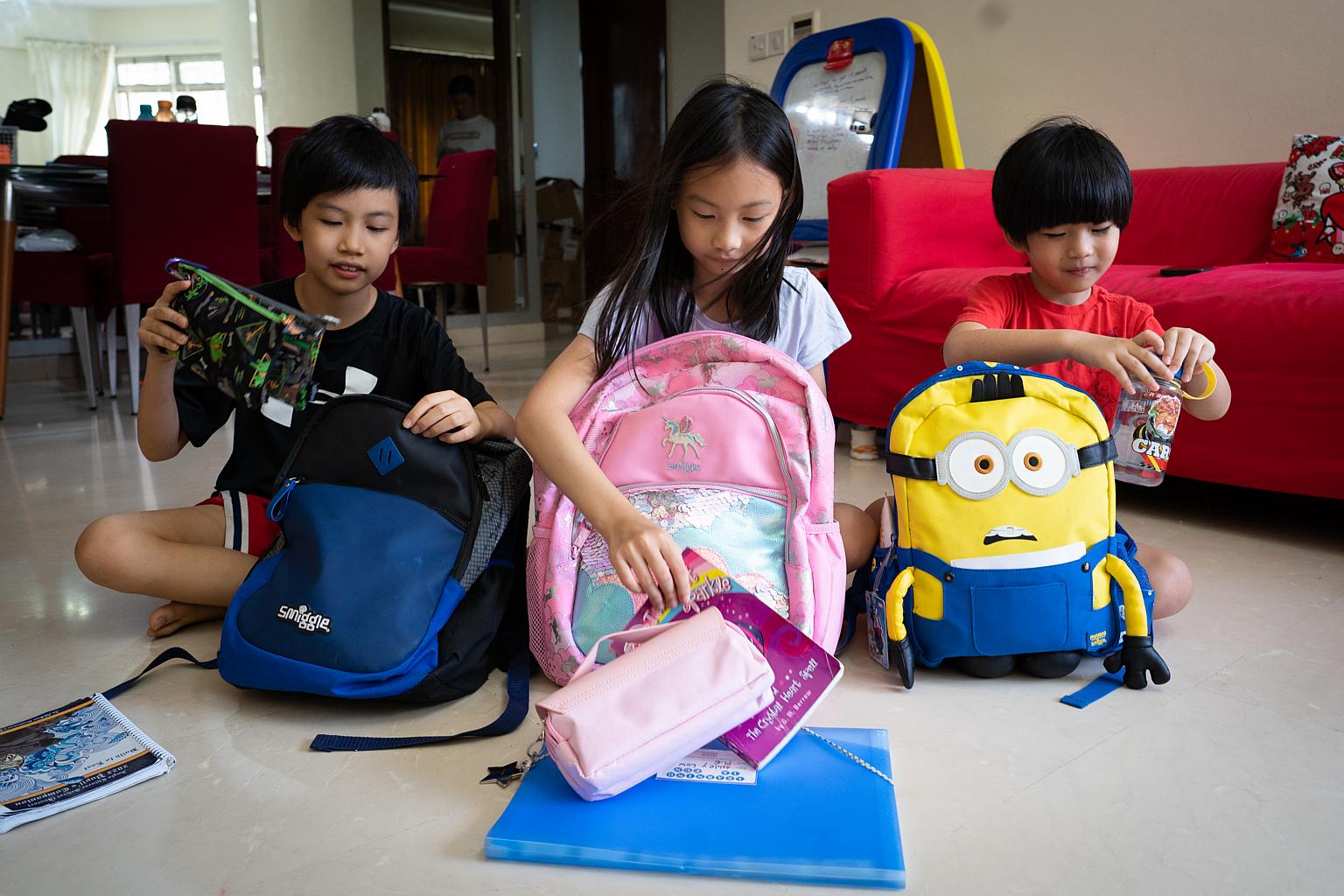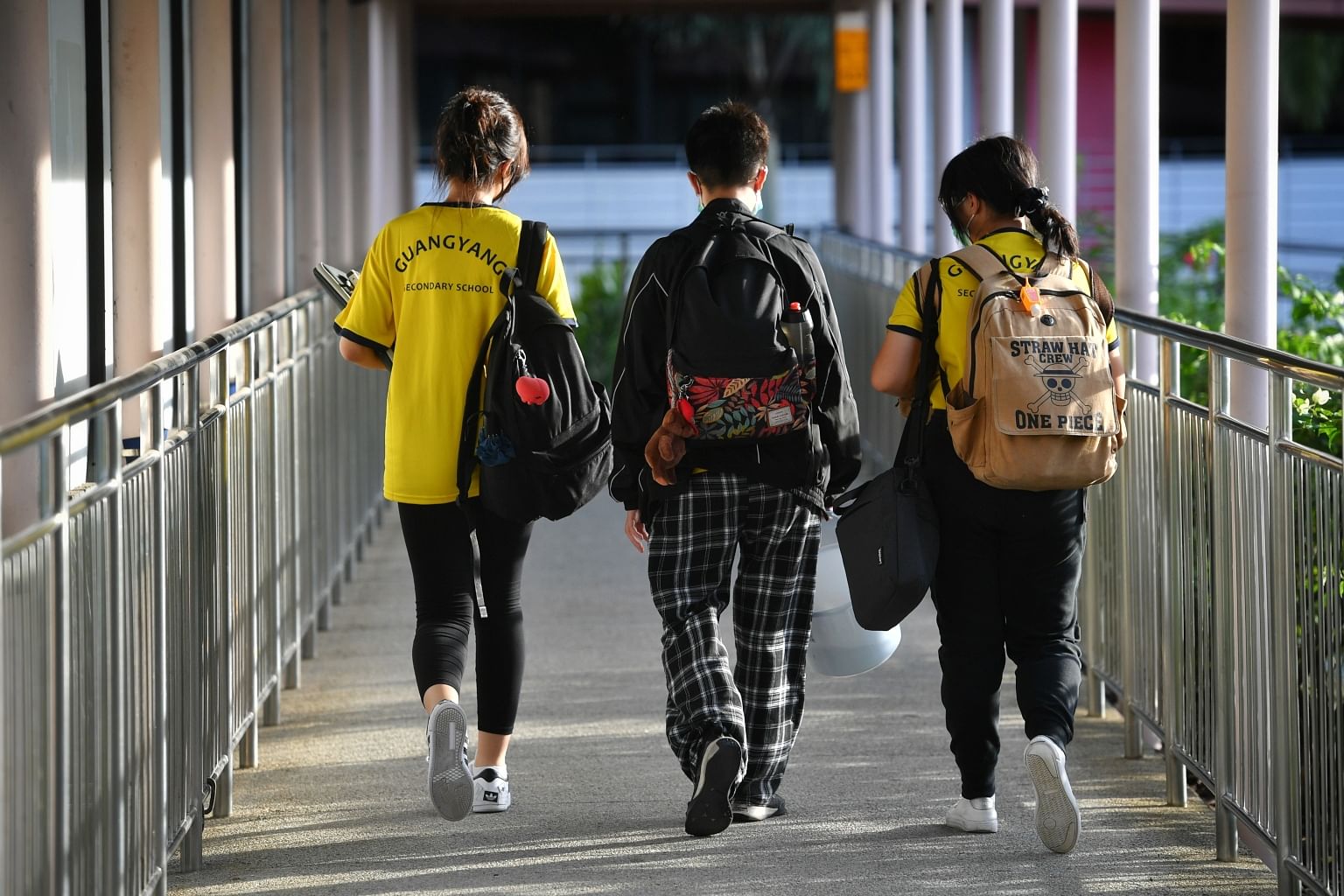Smart Parenting: How to help your kids get over the back-to-school blues
Sign up now: Get tips on how to help your child succeed

(From left) Siblings Riley Low, nine; Ashley Low, seven; and Bradley Low, six, packing up their own school bags.
ST PHOTO: SYAMIL SAPARI
Follow topic:
SINGAPORE - More than 400,000 students from primary schools to junior colleges will be making their way back to school on Monday (June 27), as the June holidays come to an end.
Returning to the days of school timetables and 6am wake-ups can be tough at first, especially as many families have taken the chance to travel abroad during the month-long break.
The Straits Times speaks to experts about how parents can better ease their children back into the school routine.
Reset sleep
Former teacher and author Fynn Sor says children may be used to sleeping in and staying up late during the holidays.
They need some time to adjust, so their routines should be restarted at least a week in advance. For families who might be dealing with jet lag after an overseas trip, more time may be needed, she says.
Plan for learning activities such as reading, writing short journal entries and completing holiday homework in the morning, to help the child adjust to handling mentally challenging academic tasks in the earlier part of the day, she adds.
Civil servant Vivien Low, 41, says bedtime for her three children aged six to nine during the June break did not change that much.
"During term time, we usually get them ready for bed by 8pm and lights out by 8.30pm. During the holidays, we were not so strict, so lights out could be by 9pm."
Ms Susan Koh, a family life specialist from charity Focus on the Family Singapore, adds that parents should also reinstate rules on technology use, like curfews and not allowing mobile phones in the bedroom.
Gearing up for school
Run through the school day with your kids in advance, says Madam Sor, a mother of three, as everyone might have forgotten the routine after a long break.
"On the first few days of school, everyone is still getting used to the school-day routine, so children (and even parents) might need more time than we expect," she says. It might help to wake up a little earlier so that there is extra time to get everything ready, she adds.
Pack the school bags and get the uniforms and shoes ready at least three days before school starts, she says, so that there is sufficient time to purchase missing supplies.
"You want to pack the school bags with your little ones, and not for them, so that they know what they have in their bags and where to find them," says Madam Sor, whose son is aged nine, and daughters are seven and three.
West View Primary School principal Eddie Foo says making the transition from a non-routine holiday period to the school term involves getting some structure back into the day for children. "Get them to put in place habits they might have forgotten, like packing their bags and other independent activities," he says.
Talk to your child
Madam Sor, founder of Happy Tot Shelf, an early childhood learning company, says parents can talk to their children about going back to school ahead of time.
"If your child expresses stress or anxiety about returning to school, acknowledge these negative feelings. Have a chat with your children to find out why they are not looking forward to school. Then help them look for coping strategies," she adds.
Ms Koh says: "Be intentional to engage our children to talk about returning to school and what to expect instead of being on autopilot mode and letting things happen."
She suggests prompting children to remember what they enjoy about school, like seeing their friends, taking part in their co-curricular activity or ordering their favourite food from the canteen.
"Listen without jumping in to problem-solve and invite the child to respond on what support or help he or she hopes parents can provide," she adds.
Set goals
Parents can discuss with their older children - those in primary and secondary school - their goals and plans for the new school term, says Madam Sor.
For teenagers, take time to look through their school schedule and highlight major upcoming events like examinations, competitions or school-closure days, so that they can prepare if necessary.
Mrs Low, whose daughter is in Primary 1, son in Primary 3 and a younger son in Kindergarten 2, says what has helped them is her printing out a monthly calendar and putting it up in the home for them to refer to.
"I would print it out two months in advance and ask them to fill it up, whether it's school activities and work, or extra programmes or leisure outings," she says. "I did this based on feedback from the kids that they don't like surprises and want to know what to expect."
"So they know when the school term starts and are prepared," she adds.
In Mr Foo's school, he has put into practice a "Start it Right" day since 2015, at the beginning of the term after the June holidays.
The usual timetable for the first day of school is suspended, and academic lessons are replaced with activities for the pupils, such as spending time with their form teachers, bonding with their classmates and setting targets.
"This term, the children will be taught how to work out an after-school timetable, so that they can have some daily structure and use their time better," he says.
"A lot of children's motivation for their studies stems from their attitude and behaviour. So, instead of diving straight into lessons, we put aside this day to get the momentum going," says Mr Foo.
"Once we start it right, we get it going... and get better outcomes, in terms of discipline and learning attitude."
Manage emotions

Ms Koh says children may struggle to return to school after a long break.
"It is only natural that most children would feel overwhelmed at the thought of giving up their newly experienced freedom and moving back into an environment of structure, stress and studies."
Older children and teenagers might not look forward to the academic stress or, for some, having to face bullies, she adds.
Parents can encourage them to journal and express their feelings, she says, which is a helpful exercise for children who are more introverted or introspective.
For younger kids, role-playing scenarios can help them gain confidence in managing situations in school or their emotions, she says.
"Depending on the personality of the child, sometimes having a buddy system helps too. Parents can make arrangements with their child's good friend to head to school or walk to class together," she says.
And for pre-schoolers, providing them with their favourite toy to take along in their bags can help them feel calm and secure, she adds.
Do not expect too much
Despite all the preparation, the reality is that the children might still not naturally wake up early, especially in the first few days of school, says Mr Foo.
"Don't expect them to set an alarm clock and get up on their own. Parents must be patient. Be physically present with them and wake up early with them," he says.
Ms Koh adds: "Be prepared that the first few days or week could be a rough adjustment phase for our children. They may get more tired after their first few days back to school, struggle to pay attention in class or become less tolerant.
"We must manage our expectations and emotions and provide safe spaces for our children to whine and vent. Once the big emotions settle, hold and assure them that you are there for them and you support them."

